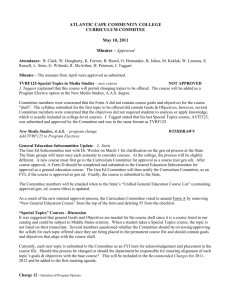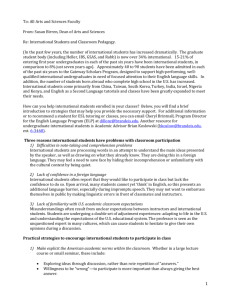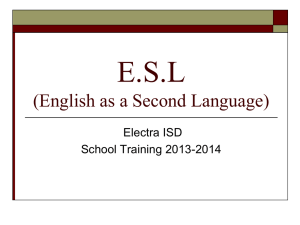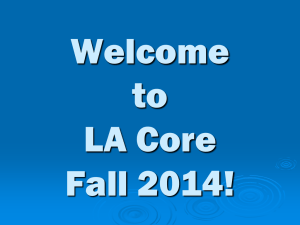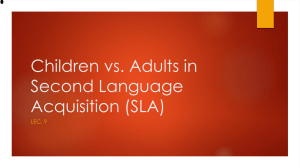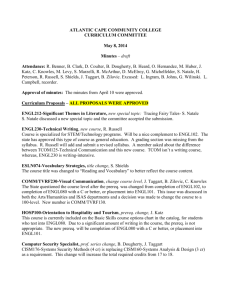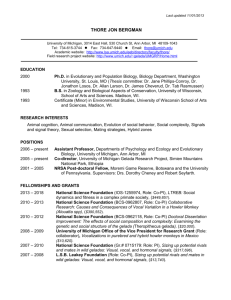October 11, 2012 - Atlantic Cape Community College
advertisement
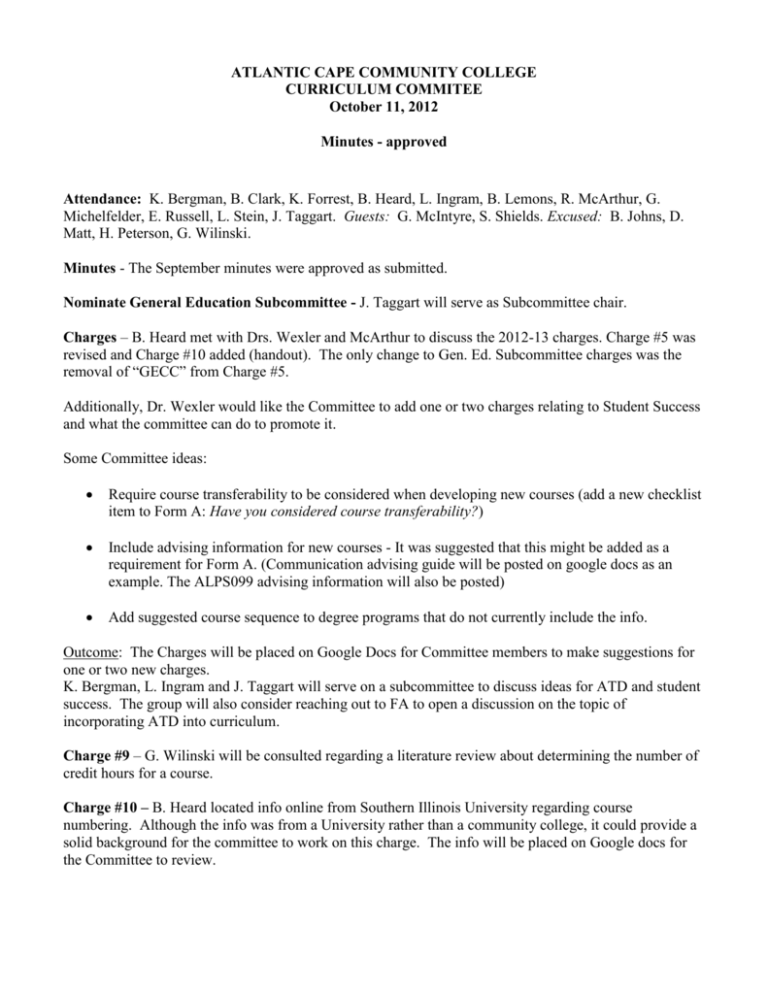
ATLANTIC CAPE COMMUNITY COLLEGE CURRICULUM COMMITEE October 11, 2012 Minutes - approved Attendance: K. Bergman, B. Clark, K. Forrest, B. Heard, L. Ingram, B. Lemons, R. McArthur, G. Michelfelder, E. Russell, L. Stein, J. Taggart. Guests: G. McIntyre, S. Shields. Excused: B. Johns, D. Matt, H. Peterson, G. Wilinski. Minutes - The September minutes were approved as submitted. Nominate General Education Subcommittee - J. Taggart will serve as Subcommittee chair. Charges – B. Heard met with Drs. Wexler and McArthur to discuss the 2012-13 charges. Charge #5 was revised and Charge #10 added (handout). The only change to Gen. Ed. Subcommittee charges was the removal of “GECC” from Charge #5. Additionally, Dr. Wexler would like the Committee to add one or two charges relating to Student Success and what the committee can do to promote it. Some Committee ideas: Require course transferability to be considered when developing new courses (add a new checklist item to Form A: Have you considered course transferability?) Include advising information for new courses - It was suggested that this might be added as a requirement for Form A. (Communication advising guide will be posted on google docs as an example. The ALPS099 advising information will also be posted) Add suggested course sequence to degree programs that do not currently include the info. Outcome: The Charges will be placed on Google Docs for Committee members to make suggestions for one or two new charges. K. Bergman, L. Ingram and J. Taggart will serve on a subcommittee to discuss ideas for ATD and student success. The group will also consider reaching out to FA to open a discussion on the topic of incorporating ATD into curriculum. Charge #9 – G. Wilinski will be consulted regarding a literature review about determining the number of credit hours for a course. Charge #10 – B. Heard located info online from Southern Illinois University regarding course numbering. Although the info was from a University rather than a community college, it could provide a solid background for the committee to work on this charge. The info will be placed on Google docs for the Committee to review. Curriculum Proposal ESLN071-Fundamentals of Pronunciation, new course - S. Shields, G. McIntyre This course is needed for students who come into the program at a higher level, but are still difficult to understand. It’s hard to reverse “fossilized” pronunciation behavior so this course will catch students early. Focus on specific sounds such as “th” and final “s” on the end of words. The lower level courses focus on actual sounds and quieter, more reserved students will need to use their voice and practice sounds. This will be an elective course for those students who have special need. There was a discussion about the length/number of required credits for the ESL program and potential financial aid issues that degree seeking students might encounter due to the number of pre-college level credits required. K. Bergman stated that the standard ESL program length is 5-7 years for students to attain academic fluency. Our program is two years. The ESL program is approximately 42 credits in length. Most students test into 072 or 090. A Committee member asked if the content of the proposed course could be integrated into current course offerings. The presenters stated that all ESL courses integrate speaking, listening, and writing skills. The results of a survey to the academic depts. indicated that many of the issues faculty are having involve not being able to understand former ESL students. This course will help students improve pronunciation. APPROVED (unanimous) Discussion of proposed Form A revisions There was a discussion about definitions of SLOs vs. Learning Objectives on the new standardized format for the syllabus. Questions should be directed to an Assessment Team member (A. Shelton, A. Nigro, L. Montefusco, M. Eubanks). R. McArthur stated that A. Wexler was the President of the Academic Officers’ group and the new Syllabus format contains the information that Middle States will want to see. Several members were concerned that the confusion regarding syllabus info. might prevent faculty from bringing new innovative curriculum to the table. A member suggested that course descriptions be revised using plain English and shortened into one or two sentences. Some degree programs do not list a suggested course sequence. This could be added to help with advising and student success. A member stated that departments were asked to complete all syllabi updates by the end of spring 2012. The Assessment Group changed the standard syllabus format over the summer. Now syllabi are not due until the end of the fall semester. The Committee would like to have clear definitions of Student Learning Objectives, Student Learning Outcomes and Learning Goals. Outcome: Form A revisions will be delayed until the Committee determines if any additional changes are needed. Secretary for November meeting – K. Forrest volunteered to take minutes at the November meeting.


